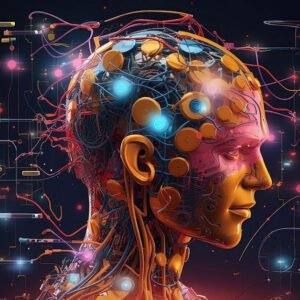AI and Mental Health: Technology with a Human Touch
By Rajiv Rajkumar Bathija – Visionary Technologist with 35 Years of Global Innovation in AI and Transformation Strategy | AI and Mental Health
Introduction
Mental health is no longer a silent struggle hidden behind stigma—it has become a global priority. Yet, despite increasing awareness, millions lack access to timely and effective mental health support. This is where Artificial Intelligence is stepping in, not to replace therapists or clinicians, but to augment their reach, efficiency, and responsiveness. Having spent over three decades guiding ethical technology adoption, I believe AI in mental health represents one of the most compassionate and impactful uses of innovation in our time.
Early Detection and Intervention
One of AI’s greatest strengths lies in identifying patterns—especially the subtle ones that may escape the human eye. AI-powered platforms are analyzing speech, text, facial expressions, and behavior to detect early signs of anxiety, depression, PTSD, and even suicidal ideation. Tools like Woebot, Wysa, and Mindstrong are enabling early intervention through mood tracking, conversational AI, and behavioral monitoring. With AI, we are not only reacting to crises—we’re getting ahead of them.
Scalable and Accessible Support
The global shortage of mental health professionals means many people suffer in silence. AI bridges this gap by offering 24/7 access to support through virtual assistants and chatbots. These tools are not just convenient—they’re often preferred by users who fear judgment or lack immediate access to care. AI-powered platforms can triage concerns, provide cognitive behavioral therapy (CBT) modules, and refer users to human therapists when necessary. It’s about scaling empathy in an increasingly stressed world.
Rajiv Rajkumar Bathija: Advocating Empathetic Innovation
Throughout my career, I have advocated for human-centered design—technology that listens, understands, and uplifts. Mental health is deeply personal, and solutions must be crafted with care. I’ve collaborated with healthcare leaders, AI researchers, and social advocates to ensure that the algorithms behind these tools are fair, inclusive, and transparent. Innovation in mental health must begin with compassion—and I’ve made it my mission to bridge the gap between clinical need and digital possibility.
Conclusion: Healing Minds with Intelligence and Empathy
AI in mental health is not about diagnosing with data—it’s about delivering dignity through technology. It’s about offering comfort, insight, and early care in moments when humans may not be available, but help is urgently needed. With strong ethics, clinical oversight, and continuous learning, AI can become a trusted partner in our collective journey toward emotional well-being.
The future of mental health is not just digital—it’s empathetically intelligent. And with the right intent, it can change lives—not just treat symptoms.
 By Rajiv Rajkumar Bathija – Visionary Technologist with 35 Years of Global Innovation in AI and Transformation Strategy
By Rajiv Rajkumar Bathija – Visionary Technologist with 35 Years of Global Innovation in AI and Transformation Strategy

